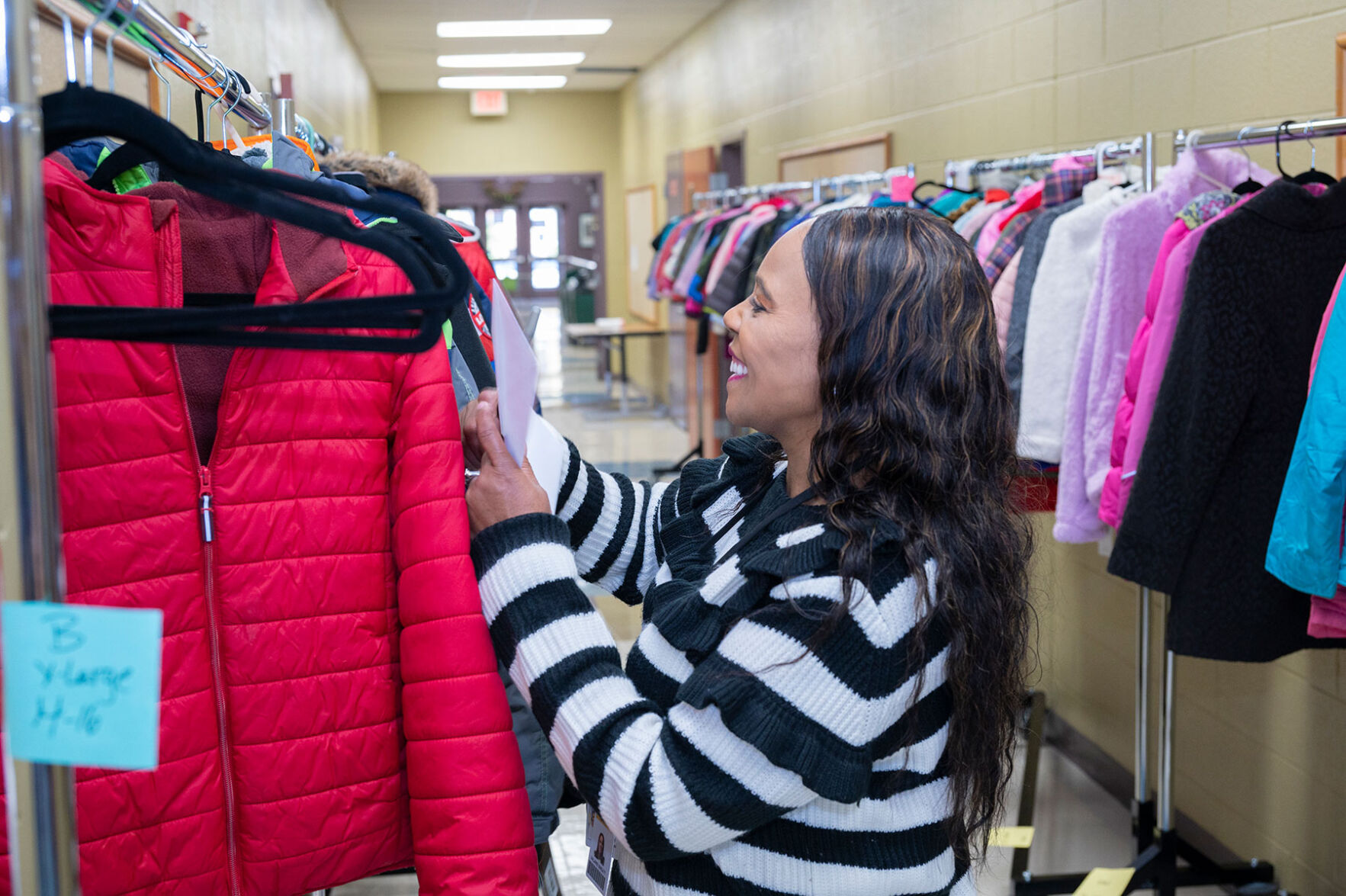The old Buena Vista Elementary School building no longer hosts students and teachers in the capacity that it used to, but it’s still serving Metro Nashville Public Schools students and their families. In March, MNPS’ Homeless Education Resource Office — often referred to as the Homeless Education Resource and Outreach Program for Families in Transition, or the HERO program — started moving into the unused building. These days, it holds countless clothing items, food products, hygiene supplies and more.
“Prior to this space, we had half a portable at central office, we had a portable at Percy Priest [Elementary, and] we had things stashed in the garages of my friends and families scattered all throughout Nashville,” says HERO program coordinator Catherine Knowles. “Being able to unite all that stuff in Buena Vista is a great benefit to us.”
So far this school year the program has served more than 2,000 students, and Knowles expects that number to surpass 3,000 by the time classes end in May. In the past five years, the office has served nearly 18,500 students and their families. During that time, the number of students who qualify for its assistance has ranged from 3,145 to 3,964 — except for the 2020-2021 school year. That year, 2,659 students received related services from MNPS, but the drop wasn’t necessarily due to a decreased need. (In fact, as families were affected by the pandemic, it’s very likely that more could have benefited from the HERO program’s services.) But rather, without in-person interactions as a result of the virtual learning, MNPS staff could not as easily identify students who qualified for assistance.
This phenomenon reflects a nationwide trend that’s explored in the recent report “Lost in the Masked Shuffle & Virtual Void” from nonprofit organization SchoolHouse Connection and the University of Michigan initiative Poverty Solutions. It also speaks to the crucial role and responsibility that schools serve in identifying and serving students experiencing homelessness — and there are more than folks might think.
The HERO program was created as a result of the McKinney-Vento Homeless Assistance Act, which requires that students experiencing homlessness receive equal access to education. The federal law defines students experiencing homelessness relatively broadly, as “individuals who lack a fixed, regular, and adequate nighttime residence.” This includes students who are sleeping in shelters, vehicles, public spaces, hotels, or friends’ or relatives’ houses, which differs from the more narrow definition provided by the federal Department of Housing and Urban Development. While MNPS can serve a wider range of houseless students and families through the McKinney-Vento Act, it can’t actually provide housing. It can, however, distribute school supplies, food, transportation, assistance with enrollment information and connections to other community resources.
Transportation is a particularly signficant aspect of the HERO program, as it allows students to remain enrolled in the same school even if they’re moving around a lot. Research like that of the Society for Research in Child Development links frequent residential moves to impaired academic performance and social skills. Though recent bus driver shortages have affected many MNPS students, the HERO program’s federal obligations and funding mean its transportation capabilities aren’t entirely contingent on MNPS’ bus availability. It can, for example, outsource transportation when needed and provide mileage reimbursements for families who have their own vehicles.
Knowles hopes the HERO program’s new location in Buena Vista Elementary can become “a center where families can come and kind of have a one-stop shop and get a lot of their needs met all in that one space.” HERO staff has already started hosting evening events, and Knowles hopes to eventually provide child care, before- and after-school programming and medical services.
The program has also been able to expand its offerings by forming community partnerships. Volunteers provide vital contributions, and the HERO program shares its building with UniCycle, a local nonprofit that collects and distributes gently used standard school attire. UniCycle can also accept donations to cover costs the HERO program isn’t allowed to because of federal regulations. Other organizations like Soles4Souls and the Community Resource Center also provide materials for families, and Knowles says HERO is looking to partner with even more.
The community support is impressive, but the need for it stems from a larger systemic issue — Nashville’s affordable housing crisis and a lack of adequate resources for people experiencing homelessness. “The critical shortage of affordable housing really is something that we see impacting students and families every day,” says Knowles. That’s why the HERO staff makes a point to emphasize that the program serves those who may not consider themselves homeless, but in transition. “We don’t come in [saying] we need to judge you or we need to make all these determinations or put you on some big list. We’re really just trying to engage with you around this issue about your housing instability, so that we can offer services and supports so that your child can stay connected and be successful in school.”
Those looking to support students experiencing homelessness and those in transitional housing situations can do so by volunteering with the HERO program, donating items like clothing, groceries and home goods, or making financial donations to organizations like UniCycle. The HERO page on MNPS’ website has more information on how and what to donate. Folks can also educate themselves and others on the many factors that lead to homlessness so they can better understand how to identify and support people who could benefit from programs like HERO.
“More than anything,” says Knowles, “it’s just really taking a look around at what’s happening in our community and really deciding what you are OK with and what you’re not OK with, and then engaging to make sure that Nashville is a community that’s working for all.”





